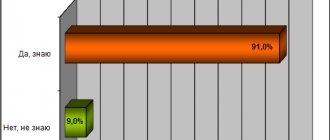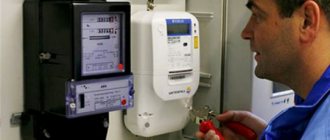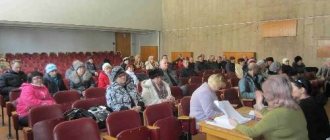Ask a lawyer
faster.
It's free! Free legal consultation Moscow and Moscow region: +7 499 938-93-12 St. Petersburg and region: +7 812 467-39-73 Fed.
number: 8 800 350-73-54 CONSULTATIONS CONDUCTED: today - 21, per month - 687, per year - 11,345
Regular increases in utility bills are the cause of dissatisfaction among many Russians. The numbers in payments are increasing with enviable consistency, which does not in any way affect the quality of services. In this regard, people are wondering whether management companies have the right to increase tariffs without the consent of residents. It is worth finding out what the law says about this.
Does the management company have the right to increase housing maintenance fees?
When considering such a topical issue for citizens, you need to turn to the provisions of the Housing Code of the Russian Federation. Article 154 of the Housing Code provides residents with a wide range of powers, including determining the amount of payment for the maintenance and repair of residential real estate.
The structure of such expenses includes:
- Supply of cold and hot water, drainage.
- Supply of gas (including bottled gas) and electricity to apartments.
- Carrying out ongoing repair work.
- Heating of apartments (as well as supply of solid fuel if the heating is stove).
- Ensuring sanitary and hygienic standards, cleaning, organizing lighting in common areas.
If a housing cooperative or HOA has not been created in an apartment building, decisions on raising tariffs are made at a general meeting of owners of the OSS. In relation to citizens occupying living space on a social tenancy basis, the adjustment of tariff rates is the responsibility of local governments.
But in most cases, management companies are responsible for maintaining high-rise buildings. The management company is just an intermediary between the owners and resource supply organizations. She does not have the right to arbitrarily increase fees for residents; we can only talk about recommendations of a recommendatory nature
There is only one exception to this rule. In order for the management company to adjust the amounts in payments, the corresponding norm must be stipulated in the management agreement of the apartment building . If there is no indication in the agreement about the possibility of unilateral indexation of housing and communal services tariffs, it is impossible to do without conducting an OSS.
Oh, this is housing and communal services.... What to do with inflated ODN?
Photo: KP Archive
What is ODN and what is it eaten with?
First, let's figure out what ODN is. These are general house needs. They represent a payment resource in the housing and communal services system, which is calculated from the state of part of the resources used for the maintenance and maintenance of apartment buildings. Inflated OTC may be accrued:
1) due to the total debt of the house, including the debts of neighbors;
2) operation by citizen-consumers of indoor metering devices with expired state verification. The inaccuracy of measuring electricity and the volume of water consumed inside the apartment using such metering devices leads to an increase in the value of ODN;
3) incorrect and untimely taking and transmission of readings from individual metering devices by citizen-consumers;
4) irrational use of electricity and uncontrolled consumption of water for general household needs;
5) unauthorized resumption of electricity supply to the apartment after the introduction of restrictions, because The electricity consumed in such apartments is distributed to the single distribution point;
6) illegal connection by citizen-consumers to in-house electrical equipment networks in addition to the in-house metering device;
7) unauthorized connection to intra-house electrical networks;
Who is right?
Management companies say one thing, residents say another, lawyers say another... Let's try to figure out who is behind the truth... And the truth is behind the Law!
Let's start with the fact that housing legislation is under the joint jurisdiction of Russia and the constituent entities of the Russian Federation. In the Republic of Tatarstan, in the summer, Resolution of the Cabinet of Ministers of the Republic of Tajikistan No. 1079 was canceled, and in its place Resolution of the Prime Minister of the Republic of Tajikistan No. 1347-r was adopted. In fact, they are similar in terms of payment for electricity, hot and cold water according to metering indicators. The regulations do not indicate that excess ODN must be paid by Management Companies. In response to requests from residents, representatives of the management company, brazenly relying on the illiteracy and timidity of the residents, claim that the bills are inflated due to the debt of the neighbors of those applying.
On July 1, 2013, changes were made to the “Rules for the Provision of Utility Services” regarding the calculation and accrual of DST. Now expenses for general household needs for consumers should not exceed established standards. However, local regulations do not say anything about payment of excess ODN. Let's consider options for excessive expenditure of resources on one-way equipment. The legislation provides for several options, and only the general meeting of owners is authorized to choose the appropriate one(!):
Option No. 1 - the management organization pays for excess consumption from its own funds.
If the owners did not make a different decision at the general meeting, then the Management Company will have to pay for excess consumption at its own expense . This rule was introduced into the Rules for the Provision of Utility Services (clause 44) so that Management Companies have a financial interest in carrying out system repairs, applying energy-saving technologies, and ultimately reducing the consumption of electricity in homes.
However, most Management Companies do not want to incur such expenses at the expense of their profits. To relieve themselves of this burden, companies are doing their best to initiate meetings in houses, at which owners are asked, in particular, to distribute the excess amount of one-time tax among all owners.
However, it must be admitted that if an organization really services a worn-out housing stock, and the collection of payments does not allow for repairs and the application of energy saving measures, the company will suffer enormous losses, which can lead to bankruptcy or termination of the management contract with the owners at the initiative of the management company.
Option No. 2 - Excess standards are paid by the owners
This option is applicable if a direct management method has been chosen for the house or an HOA has been created. You need to understand that with these management methods there is no provision for making a profit, which means there is simply nothing to compensate for the excess ODN. If the owners do not make an appropriate decision, there will be no choice but to pay the costs from the payments that residents pay for the maintenance and ongoing repairs of the house. But in this case, you need to understand that residents may not receive quality services for these types of work.
Therefore, the owners have the right, under any method of management (Management company, HOA, direct management), at a general meeting of owners to make a decision on the distribution of the excess volume of ODN between all residential and non-residential premises in proportion to the size of the total area.
If ODN is below the standard
The owners pay the actual expenses of the ODN. If expenses for one-time taxation are zero, then one-time taxation is not accrued.
Thus, residents receive receipts for electricity, cold water supply and hot water with two types of charges - individual consumption and single consumption.
Payment for individual consumption is calculated using the formula:
if there is a door-to-door meter:
Fee = Consumed resource per month (according to meter readings) * tariff Fee = Consumed resource per month (according to meter readings) * tariff
if there is no apartment meter:
Fee = Standard (individual consumption) * number registered in the apartment * tariff Fee = Standard (individual consumption) * number registered in the apartment * tariff
Accrual of ODN in houses without metering devices
If the house is not equipped with a common house meter, then the payment to the owners for ODN is calculated according to the standard according to the following formula:
ODN payment = ODN standard * S of the total property of the house * (S apartments / S of all residential premises in the house)
Accrual of ODN in houses with common house metering devices
If the house is equipped with a common house metering device, then the payment to the owners for ODN is calculated according to the following formula (the formula is simplified, the full calculation formula is presented in Decree of the Government of the Russian Federation dated 05/06/2011 N 354, formula No. 12):
ODN fee = Consumed resource (according to the readings of the general building meter) – Consumed resource by all residential and non-residential premises (according to the readings of apartment meters / according to the standard) * S apartment / S all residential and non-residential premises in the house.
What to do if there is an overstatement in your ODN invoice?
People will be happy to scold and find fault with everyone, including for charging an inflated one while sitting on the couch, but they will not want to personally change anything and at least raise their butt and start taking action. If you nevertheless decide to deal with the charges on your invoice, then the first thing you need to do, according to the lawyer, is to create an active Apartment Building Council. Those. The body that controls the activities of your management company. Residents of the house will know about each other, who has what problems and debts. And not every tenant of a 100-400 apartment building will run chaotically to the management company with complaints, but the chairman with a list of claims from the owners of apartment buildings. Moreover, according to the Housing Code, each apartment building must have its own council. According to the documentary reports of the Criminal Code, they exist... True, sometimes they are dead souls. In practice, there are cases when the chairman of the council may be a grandmother who died 5 years ago...
What about the Criminal Code?
The managers of the management company can also be understood in their own way... The volume of complaints from residents is simply colossal. But this does not negate the fact that they are obliged to respond and help residents figure it out, and not send unsubscribes... Many of them know that it is illegal to charge one tax, but they charge it anyway. Therefore, citizens must take care of themselves, must know about their rights and use them as part of the council of an apartment building. If you are an owner, you must take care of your property and take care of it.
The lawyer of the Tatarstan Regional Public Organization for the Protection of Consumer Rights “Fair Housing and Communal Services” Zaur Gibadullin helped deal with the ODN
Arbitrage practice
The courts also agree that a unilateral increase in rent for an apartment contradicts the fundamentals of the current legislation. As an example, it is worth considering the following cases from judicial practice.
- Residents of one of the high-rise buildings in Barnaul have approved the tariffs for repairs and maintenance of their premises. When the Management Committee began to insist on increasing housing fees, members of the general meeting unanimously opposed it. However, a surprise awaited the owners in the next payments for housing and communal services: the tariffs were nevertheless increased. The prosecutor filed a lawsuit against the management company, acting in the interests of the residents. The result of the proceedings was the decision by the judge of the Leninsky District Court of Barnaul to recognize the actions of public utilities as illegal. People were recalculated and overpaid funds were returned.
- Residents of an apartment building in Moscow discovered that with the onset of July, the figures on their bills for some items suddenly increased. Outraged people filed a collective complaint with the Housing Inspectorate. Officials supported the residents and sent an order to the management company to reduce tariffs, but the utilities refused to eliminate the violation. The court that considered the Housing Inspectorate's claim put an end to this dispute. As it turned out, the management agreement included a clause requiring residents to agree to an annual revision of the cost of utilities.
Thus, increasing tariffs for owners without their consent is illegal . The Ministry of Construction of the Russian Federation adheres to the same point of view in its information letters.
However, property owners cannot reduce fees for housing and communal services without taking into account the opinion of the management company. Even if such a decision is made at a general meeting, the management company has the right to ignore it.
Also, the Criminal Code may file a lawsuit to declare the decision of the OSS illegal. The defendant in this situation will be the initiators of the meeting, who will bear the legal costs.
Independent increase in management tariffs
The management company issues an ultimatum: either +3 or they abandon us.
Let's analyze what is wrong with this approach. It should be noted that the cost of maintenance should not be set arbitrarily, and the Housing Code of the Russian Federation directly speaks about this.
We are satisfied with the company. How to get a refund for 3 months of 2020. Elena Good afternoon. For the indicated months, you can request a refund in the following order: 1. Write a claim to the Criminal Code and demand your money back. justification - absence of grounds for promotion and reference to the decision of the OSS.2.
If there is no reaction, or there is a refusal, you need to file a claim in court with the Criminal Code. If you are sure that there will definitely be a refusal, you can immediately file a claim in court. You can also write complaints to the housing inspection, or to the prosecutor's office, or better yet, there and there. With respect. Vasiliev Dmitry.
April 06, 2020, 10:34 1 0 fee received 36% 8.6 Rating Pravoved.ru 13876 responses 5265 reviews expert Chat Free assessment of your situation Lawyer Free assessment of your situation
- 8.6 rating
- expert
Is it legal to increase tariffs for the maintenance and repair of housing by a management company (hereinafter referred to as the Management Company)? How often can the management company raise this tariff, in what amount, and should the management company notify homeowners?
Hello. First, let’s establish that, according to Article 154 of the Housing Code of the Russian Federation, you pay for residential premises and utilities and for rent if the apartment is municipal. What is included in the fee for residential premises: fees for the maintenance and repair of residential premises, including fees for services and work on managing an apartment building, maintenance, and routine repairs of common property in an apartment building.
We recommend reading: How to get a copy of a court order
For example, the fee is 15.50 rubles.
for 1 sq.m. this amount must be divided and clearly reflected in the management agreement.
Let's say from this amount: - 5.90 rubles. management fee (MC income, salary, rent of transport, office and other expenses); — 3.9 rub. fee for technical maintenance and repairs.
This means that the management company must fit into this amount so that there are no accidents in your home for the whole year, and carry out maintenance in a timely manner.
Maintenance, insulating the entrance, eliminating accidents, leaks, etc.
Moreover, if the amount for maintenance was collected in the amount of 250,000 rubles, and the management company declares that it carried out repair work for 650,000 rubles. - this is her headache, and she cannot take this money from current repairs. Or vice versa. This position is set out in the resolution of the plenum of the RF Armed Forces No. 11. Now what is current repair? This is, accordingly, 5.70 rubles that you pay for current repairs.
The management company does not have the right to dispose of this money independently without a decision of the general meeting of the house (clause 4.1.
Article 44 of the Housing Code of the Russian Federation). This means that if the management company says that this money has been spent, then this should not happen.
The management company cannot spend a single penny without signing the estimate and the certificate of work performed by the chairman of the house council, which can be done if the meeting approved the estimate of work and cost. Otherwise, this should be dealt with by law enforcement agencies. In addition, according to State Construction Resolution No. 170, the organization responsible for the technical maintenance of the house must carry out repairs to the entrances once every 3-5 years. Thus, if you don’t go, what would you do again... It is necessary to convene a meeting of residents, demand a report on expenses from the management company, estimated types of work indicating the cost.
Calculate debit and credit yourself and approve a plan for specific work. Don't be afraid to demand an account. After all, in a store you ask for a receipt for bread, sausage and change, and count. Remember one thing: you are the employer (residents of the house), you hired an employee (MC) who services your house and for this you pay her money (salary).
And what does the director of the company do with negligent employees? Total: THE TARIFF IS SET AT THE GENERAL MEETING OF OWNERS OF MKD FOR ONE YEAR of good luck








